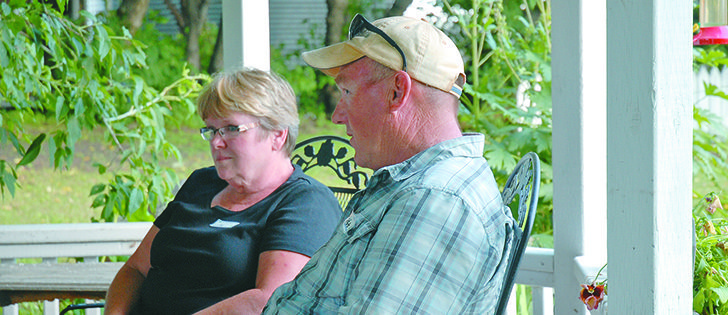CLIVE, Alta. — For Wes and Joy Shackleton, there’s more to farming than maximizing production and generating profits.
In addition to bottom lines and bushels per acre, the couple measures the success of their farm by the quality of life it provides and the strength of the family ties it creates.
“Farming is a way of life,” says Joy, who has lived on the family farm near Clive since 1977, the year she and Wes were married.
“It’s the best place to raise kids, there’s no doubt about it,” she said.
Read Also

Know what costs are involved in keeping crops in the bin
When you’re looking at full bins and rising calf prices, the human reflex is to hold on and hope for more. That’s not a plan. It’s a bet. Storage has a price tag.
“We enjoy just sitting out on our deck, watching the birds, drinking a cup of coffee and spending time with friends and family. It’s just a wonderful life.”
Added Wes: “It’s about working with your children.… When you look back at some of the crap jobs that you have to do — when you have your head down a hole or you’re trying to pull something out of a cow — it’s not always pretty, but if you have your boys and daughter right there beside you, helping and learning, that makes it worthwhile. It’s about working with your kids and teaching them little things so they know that life is not always (a bouquet of) roses.”
Hard work has always been an important ingredient in their farm’s success.
Wes’s parents moved to the Clive area from Brooks, Alta., in 1947. Wes worked with his parents throughout his childhood, milking cows, putting up hay and harvesting crops.
In 1980, he and Joy bought the farm.
Over the next three decades, they raised a family of three children and operated a successful dairy comprising 60 cows and 480 acres of crop and hayland.
The Shackletons’ children — Jan, Travis and Adam — played an important role in running the dairy.
But eventually, the children found off-farm jobs, got married and began raising families of their own.
Wes milked the last cow on the Shackleton farm in November 2006, and he and Joy sold their dairy quota shortly after that.
The Shackletons now own a small herd of beef cows. They also cut hay and grow grain and oilseeds on 300 acres.
Wes supplements the farm income by working as a seasonal crop inspector for Alberta’s Agriculture Financial Services Corp.
“It’s a great job,” he said.
“It’s like a new job everyday and I get to meet the most fantastic, interesting people, and see the whole province.”
Wes said the decision to get out of dairy production was not an easy one.
However, with the children working elsewhere and the dairy barn requiring maintenance and capital investment, it seemed like the best course of action.
Finding reliable help was also a challenge.
“We talked about it for probably five years before we decided to sell,” said Wes.
“I always enjoyed milking, but for the last few years, it was becoming like work.”
Since the dairy was sold, farm living has afforded the Shackletons more time to focus on new priorities and reflect on the bounty that the farm has produced.
Their farmyard is a picturesque oasis, complete with mature shade trees, shrubs, numerous flower gardens, rock ponds and lawns.
The manicured yardsite is testament to Joy’s love of gardening.
To support her habit, she works part-time at a nearby greenhouse at Tees, Alta.
“I don’t get paid,” Joy said.
“I just get plants. It helps pay for my addiction to flowers.”
A few years ago, the couple also embarked on a new career as tree growers.
Over the past six or seven years, Wes, Joy and other family members have planted 4,000 to 5,000 conifers, which vary in height from a few inches to a few feet.
The largest trees, which will be market-ready in two or three years, will be sold as U-cut Christmas trees to families who crave a taste of farm living.
Joy and Wes also plan to sell a rural experience that includes a drive in the country, perhaps a toboggan ride and plenty of fresh air and country hospitality.
“Never in our lives would we have thought we were going to be Christmas tree growers,” said Joy.
“But our kids … were interested in it and we saw it as a way to get them to come home more.”
With six grandchildren and another soon to come, Wes and Joy are hoping the Christmas tree business will generate lasting rewards, both monetary and otherwise.
















